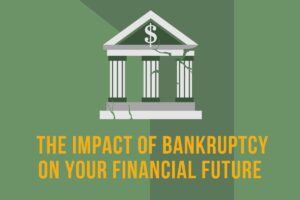The Impact Of Bankruptcy On Your Financial Future

Bankruptcy is a legal status for people who are unable to repay the money they owe. When you’re declared bankrupt, the value of all your possessions is usually shared among those you owe. This includes your car, house, leisure equipment and jewelry, basically everything except the essentials. You might also be asked to make payments towards your debt for up to three years, depending on your income.
Bankruptcy can be a scary moment since you may be worried about how it’ll affect your life, financial future and even your loved ones. But if you struggle with debt, bankruptcy can be a turning point. It gives you a chance to acquire the help you need and strive for a debt-free life. You can even create paystubs online to monitor your financial journey.
Once declared bankrupt, you won’t have to deal with the pressure of associating with creditors anymore. Lenders will have to stop most types of court action against you. But the most relieving of all, you will usually be ‘discharged’ or freed from your debts – after a year. It’s not all sunshine and rainbows, though, since getting into bankruptcy is best avoided in the first place.
Let’s discuss how declaring bankruptcy can affect your financial future in the short and long run.
Bankruptcy means debt relief.
To elaborate on the above mentioned point, once the court discharges your debt, you no longer have to worry about it. It’s gone, just like that. You might feel highly relieved if you’ve been battling debt for a while.
Now that your previous debts (or at least a decent chunk of them) are wiped out, you are provided with the time and freedom to rebuild your financial life.
Debt relief means that you won’t have creditors hounding you or being faced with relentless phone calls, emails or letters harassing you about your debt. You’d be free from fines or interest that have rendered your debt unpayable, to begin with.
It will hit your credit score.
One of the first unpleasant effects of bankruptcy that you’ll notice is the impact on your credit score. Your score will take a huge hit. The extent of the impact will actually vary, but it will be affected nonetheless.
Generally, individuals with better credit scores before bankruptcy will lose most points. If someone’s score is 700 or greater, they should expect to lose about 200 points; if the score is a little less than 700, they may lose 130-150 points.
If your primary concern is bankruptcy tanking your credit score, your score may improve over time if your borrowing habits improve. You might be surprised to notice how swiftly it can improve even just after a year of completing bankruptcy.
Decreased access to credit
You still have the chance to spike back up your credit score; however, the chances get lower each time you declare bankruptcy. Bankruptcy diminishes the ability to obtain new credit. If you even qualify for loans at all, they are likely to come with higher interest rates and reduced credit limits. Mortgage qualification is particularly limited after a bankruptcy. You may even have to wait up to four years before applying for a home loan, depending on the type of bankruptcy you file for. This waiting period is lessened to two to three years for government-backed mortgage loans.
Some debts persist
Some debts cannot be discharged through bankruptcy. For instance, debts incurred through the illegal or improper behavior of the debtor cannot be removed. This includes:
- Child support and alimony payments
- Debts unreported when filing for bankruptcy
- Debts for willful and malicious property or personal injury
- Specific condominium or cooperative housing fees
- Amounts owed to specific tax-advantaged retirement plans
- Specific tax claims and unpaid federal income tax
Student loan debt is also difficult to discharge.
Loss of tax refund and potential loss of assets
You can receive tax refunds while in bankruptcy; however, your refund may be used to pay down federal tax debt. One of the bankruptcy consequences is that your tax return may be turned over to your bankruptcy trustee to cover your debts.
Filing for bankruptcy can also delay car repossession and home foreclosure and, eventually, cause some property loss is possible. Nonexempt assets are liquidated to compensate your creditors. You get to keep your assets while making payments on an adjusted debt plan; if you default on your repayments, those assets can be at risk.
Information becomes available to the public.
Bankruptcy is a matter of public record, so future employers, clients, and families can access this information. Moreover, anyone who shares responsibility for your debt will be impacted. If you have a co-signer on any of your debts, creditors may be able to pursue them for the balance, and if you co-own a business, your partner may be required to buy you out so they can continue to maintain the company.
Bottom Line
Declaring bankruptcy can have both negative and positive outcomes, but it’s important to note that it’s best avoided overall. When you declare bankruptcy, you are exempt from harassing letters, calls or emails from creditors, which gives you a sense of debt relief. However, you also have to deal with decreased access to credit, loss of tax refund and assets, possible decrease in available credit you’ve accumulated over time, and the chance that your bankruptcy information becomes open to the public. However, there’s always a way to bounce back but to avoid the hassle, manage your money responsibly. We hope this article helped.
